Opinion
Promoting Indigenous Languages In Nigeria
Nigeria is a large country of over 180 million people, perhaps the largest country in Africa and indeed, in the whole black race. Situated in West Africa, it is larger than the whole of the sub-region. With over 250 different ethnic groups found across the length breadth of the country, there are three major tribes, viz- Hausa in the North, Igbo in the East and Yoruba in the West, each having it’s own language. However, the general language of communication in Nigeria is English language bequeathed to us by the former colonial masters, Great Britain.
Even though English is the official language of communication in Nigeria and used in teaching students in schools, the government and indeed leaders of thought have made concerted efforts to promote the study of Nigerian languages in schools. Few years ago, government saw the need for this and tailored the education curriculum towards the study of indigenous languages.
To this end, the Federal Ministry of Education made it compulsory for every student to study and register at least one Nigerian language at senior school examination. Besides, the Federal Government went ahead and established at Kano, Enugu and Abia States, the Federal Institute for Nigerian Languages. These are all geared toward the study and promotion of Nigerian languages.
Why is it very necessary to study the indigenous languages? The answers are indeed not farfetched. There are many of them, but few will be mentioned here. If a foreigner is in the midst of Nigerians of different ethnic backgrounds and they want to discuss an issue the foreigner is not supposed to know, how will they go about it? Obviously, it is impossible, hence the need to adopt a particular indigenous language which all Nigerians must accept as a lingua franca, irrespective of their tribes.
Outside of the identity issue which is paramount, promoting our languages makes it easier for those that do not speak English or do not speak it well to be part of the world. If Nigeria invests in translating key documents into our languages, it will be easier for her citizenry to understand what is happening in China or India, because the information would be written in their local languages.
The powerful countries in the world have all done that. South Africa has some nine official languages, while China supports all 55 languages in its country. They even pay to have newspapers translated into those languages. India does the same thing and even awards yearly prizes to writers in local Indian languages. Needless to say these countries have a deep identity, making them more patriotic and which makes information easily accessible to the masses, even the old and poor.
Promoting self-pride perhaps is one of the most important aspects of garnering support to promote indigenous language. Without support from the community, it’s difficult to get anything going. Without self-pride, no one will ever use the language or help the culture to survive.
Alternatively, the Federal Government can modify the school curriculum in such a way that a student must study one language other than his own. This is a unifying force and will go a long way in bringing about the much needed peace, unity and brotherhood among Nigerians. The beneficiary can therefore reside in that part of the country where he understands their language, in comfort, since the acquisition of language is a prelude to mastering their culture.
Language is tied to culture; you cannot learn the culture of the people without learning their language. Talking about culture, studying the indigenous languages of Nigeria is another way of promoting Nigerian culture, hence as I earlier said, culture and language are inseparable. By studying our indigenous languages, we will get to understand and appreciate the culture of not only our own tribes but that of others.
More than anything else, the study of our indigenous languages will enhance the standard of education. Educational psychology has proved that a child of pre-school age understand more, what he is taught in his mother tongue than what he is taught in school language. This is because, at birth, the mind of a child is totally empty and whatever values he is taught then, will register automatically in his mind. Therefore, anything in his mind becomes indelible.
It is common knowledge that a child learns to speak, using his mother tongue. For instance, he learns to speak calling “nne” or “iya” (mother in Igbo and Yoruba, respectively). If the government implements this, it should back it with the training of teachers in indigenous languages who will in turn teach students at all levels of education.
I wonder why we can’t be proud of what we have. English only became our lingua franca after colonisation. We have an identity, we have our own mother tongue. We have the resources and knowledge to make any Nigerian dialect acceptable within Nigeria. We don’t have to sit in the doldrums of insignificance. Let’s promote our culture, let’s not kill our mother tongue. If for no reason, let’s promote it for posterity sake.
Indigenous languages are, no doubt, the indices of people’s identity; they encapsulate our core traditional values that identify us and make us distinct from other people. The pursuit of national identity via the promotion of indigenous languages is not a bad idea. It will certainly help in building a great Nigeria of our dreams.
Tom writes from Maiduguri, Borno State.
Adama Tom
Opinion
Balancing Religious Freedom and Community Rights

Quote:”Communities have rights to peace, safety, and quality of life. Noise pollution, crowds, or other impacts from religious activities can affect these rights. Balancing these interests requires consideration and dialogue”.
Opinion
Kids Without Play Opportunities

“All work and no play”, its said, “makes Jack a dull boy.” Despite this age-long maxim that recognises the role of play in early childhood development, play appears to be eluding many Nigerian kids. The deprivation of play opportunities comes in different forms for the Nigerian child depending on family’s social setting or status, but the effect is much the same. For children in Nigerian poor families, life is becoming as much a hassle as it is for their struggling parents. Due to harsh economic conditions, many families resort to engaging their kids prematurely in trading activities especially in hawking, to help boost family revenues, when these kids should be enjoying leisure after school. Some of these children barely attend schools while being forced to spend much of their childhood hustling in the streets. For children from well-off families, time could be as crunchy as it is for their busy parents when, obsessed with setting agenda for the future of their kids, parents arrange stringent educational regiment too early for their kids.
These group of children are made to get-off the bed by 5.30am every weekday, get ready for private school buses that call at 6.00am, otherwise report by however means to school at 7.20am.The situation is worse for kids in the city of Lagos where the need to beat urban traffic rush-hours is very high. Most children are further subjected to extra hours of lessons after school at 2.00pm, only to be released with loads of homework. On many occasions children who leave home for school at 6.30am get back by 3.30pm. With hardly enough time to eat, do school assignments and take afternoon naps, these children hardly had time for plays before dinners. In Nigeria, kids of ages between 3 and 12 spend averages of 9 hours a day and 45 hours a week to and from schools, and additional hours doing home assignments and domestic jobs, whereas their peers in developed countries spend about half that duration and have more time for leisure.
Any remaining spare time left after school work or street hustle is further stolen, when kids who usually are fascinated by gadgets, are exposed to household electronics like phones, tablets and gaming consoles. Electronic games may create a sense of leisure, but the difference with human interactions is that kids doing games interface mostly with machines or with programme structured in ways that entrap a child’s pysch directionally, according to the game’s programming, in ways that may not encourage independent thinking. Moreso, attraction to such gadgets displaces kids’ attention from important television and radio programmes. The prevalent tight, academic schedules for some Nigerian kids, though intended for academic excellence, encroaches on childhood leisure time needed to achieve an all-round childhood development, and could make children to resent formal education altogether. Besides, academic excellence or economic pursuit, is not all there is to living a well-nurtured life.
Children’s leisure time, defined as time left over after sleeping, eating, personal hygiene and attending school or day-care, is very crucial to childhood development. Sociologists recommend that children should have at least 40 per ceny of the day as leisure. According to Berry Brazelton, a former pediatrician at Harvard Medical School, “Play is the most powerful way a child explores the world and learns about him or herself.” Unstructured play encourages independent thinking and allows the young to negotiate their relationships with their peers, and in the process build self-confidence and self-control. Play is one of the important ways in which young children gain essential knowledge and skills. Leisure time enhances learning as fun enables children to learn at their own level and pace. Young children naturally explore and learn many skills by making cognitive connections from events that catch their attention.
Unstructured plays help children developed their cognitive, physical and communication skills that make them acquire social qualities necessary in navigating relationships in adult life. Plays enable children assess how others feel and learn perspectives as well as empathy through observing differences in facial expressions, body language and even tone of voice, which helps them copy how to express themselves to others, and therefore develop socially acceptable behavours that build relationships. In cooperative activities, children willingly take things in turn and may delegate roles. Children can also share the glory of winnings through competitive games, which is all great for working together in task sharing. Aside encouraging parents to ensure adequate leisure time for their kids at home, schools should make plays and exercises an integral part of the educational curriculum. The educational curriculum set by the Nigerian Educational Research and Development Council (NERDC) includes specific training durations and break periods, as well as sporting activities, as part of the school system.
Due to poor government funding, sports in public schools have declined, while most private schools lack sporting infrastructure or even play grounds. These make recreational activities and sports implementation almost impossible in schools. Also, the increasing rate of urbanisation in Nigerian communities is gradually eroding ancient playgrounds, while established urban centres have lost community playgrounds. With tightening apartment spaces now being the norm in most urban residential areas, many kids are forced to wriggle within burglary-proof enclosures. Nigerian governments and the relevant agencies should ensure that existing child labour protection laws, educational and urban development codes are implemented in the country, to enable proper nurturing of children as the future stakeholders of our society. Private schools, especially, should be supervised to ensure they follow the educational curriculum standards set by NERDC.
In a bid to impress parents and draw more patronage as better option than public schools, private schools, most of whom operate in cramped environments, have continued to set high regiments of training schedules beyond the capacity of most kids, and even encourage enrollment of pre-school age kids who can not sit still to listen for an extended periods of time. Schools, from creche to secondary levels, without playgrounds and recreational facilities should not be allowed to operate, and should be made to understand and implement appropriate curriculum and training durations. Many Nigerian kids, whether from rich or poor families, appear to have been set-up inadvertently, in the same leisure denial that affects their parents. All work and no play could lead to some messed-up kids who grow up not understanding social cues, and being unemotional and self-centered, manifest later as obsessive-compulsive adults.
By: Joseph Nwankwo
Opinion
Congratulations Fubara, Joseph Of Rivers State

We thank God who is above all human contrivance and arrogance. Congratulations, Your Excellency Amaopusenibo Sir Siminalayi Joseph Fubara. Your victory takes us back to the Bible as a living document of a God that rules in the affairs of all His creation. In a manner of speaking, welcome back from your first war with Phillistines, Your Excellency! Yes, first example is David and Goliath! And like David, Your Excellency stands over Goliath in victory. But that is not enough. Our real enemy is that Your Excellency is Governor of a State with a wretched economy. Indigenes of Your State are today reduced to battalions of beggars waiting for who will hire their loyalty on the usual “pay-as-you-go” basis.
Your Excellency, it brings us to another Bible- based parallel. Conscientious Rivers indigenes above 50, should identify with and commit our all to this second parallel. It is to liberate the economy and people of Rivers people from 23 years enslavement and poverty, for us to regain our dignity and pride. When the economy of Egypt was drifting into a disaster zone, even Pharaoh did not know it. He also did not know what to do. But God sent a Joseph to build the economy into a fortress of good fortune that overcame the economic and social disaster Egypt did not know was ahead. Your Excellency for 23 years, Rivers State has been ruled without any logical, credible and consistent PLAN of how to overcome mass poverty from our dehydrated local economies.
Your Excellency, Rivers State cannot survive one month without Federal allocation! So called IGR only about 10 per cent of Federal allocation.It is also not based on what we produce but on tax from other people’s productivity that pass through our State. Pharaoh did not know what to do in the case of Egypt. May it please God to position another Joseph in Governor Siminalayi Joseph Fubara to heal Rivers State and build an economy that all Africa will come to access in order to chart a new course out of worsening economic hardship that is caused by near zero investment in productivity and endemic reckless looting. They are the twin chambers nursing a corporate cancer unfolding across Nigeria and Africa. The hard work begins today, Your Excellency.
We need an economic blueprint that will enrich every Rivers senatorial district from investment to grow productivity and to enrich every Rivers person from career-based productive labour, just as Pharaoh was enriched by Joseph’s economic Blueprint. Let Rivers State stop the trend of waiting the lives of young Rivers people recruited by Phillistines into cultism, thuggery and easy money, as a career. These Phillistines believe they have only lost one phase of many legal battles and battles by other means. But from comments in the public media, their eyes are fixed on 4-years of war and more! Your Excellency, we the people will not let you forget what you owe us. We have to make unbelievers see that your leadership is different and that we are uprooting the old order of an unproductive Feudal System. That system makes a few persons and their cronies to monopolise our collective wealth, while the majority are left in misery. Let’s put an end to enslavement by cabals and mass poverty in Rivers State. That is when the Phillistines will surrender.
By: Amaopusenibo Brown
-

 Maritime5 days ago
Maritime5 days agoNCC Announces Telecoms Facilities Protection Measures
-

 Business5 days ago
Business5 days agoAON Lifts Ban On Freed Ibom Air Passenger
-
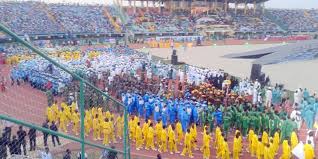
 Sports5 days ago
Sports5 days agoNYG:154 Nasarawa Contingent Storms Kwara For Zonal Eliminations
-
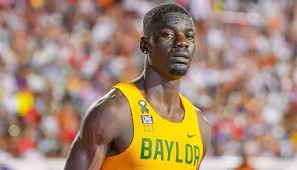
 Sports5 days ago
Sports5 days agoNathaniel breaks record as Amusan, Ofili clinch third
-
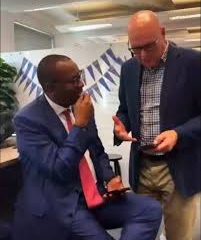
 Sports5 days ago
Sports5 days agoNigeria delegation Visits London over 2030 Commonwealth bid
-
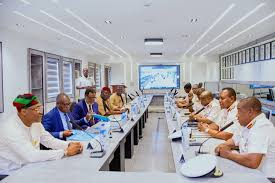
 Maritime5 days ago
Maritime5 days agoBureaucracy, Relationship Gaps, Bane Of Maritime Safety Investigation – NSIB
-
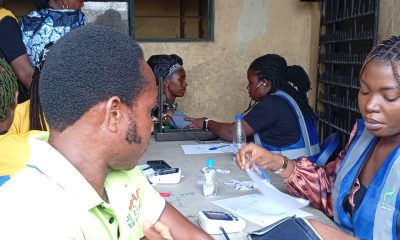
 News5 days ago
News5 days agoChurch Renders Free Medical Outreach, Others To Host Communities
-
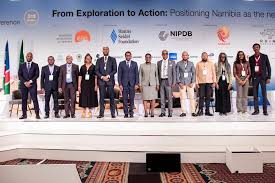
 Business5 days ago
Business5 days agoPETAN, Others Unveil ALCO, Get NCDMB’s Support … Mull Synergy With APPO, AU

